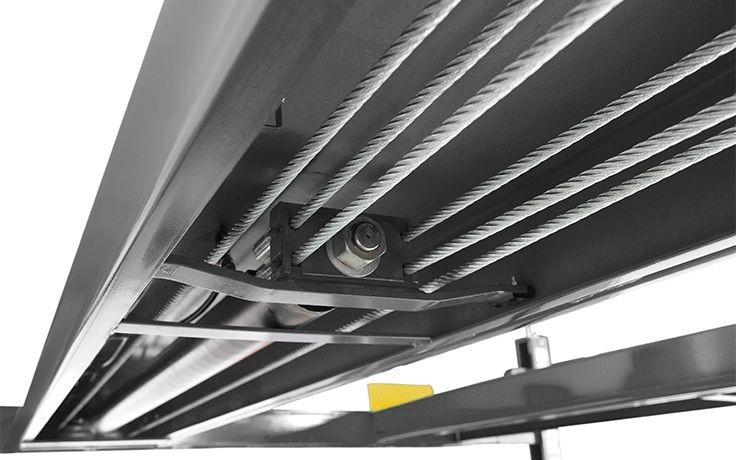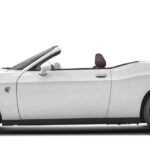Since 1984, the BendPak name has been synonymous with trust and high-quality in the automotive service industry, particularly when it comes to Hydraulic Car Ramps. Professionals around the globe depend on our equipment daily, trusting in the reliability of BendPak for their vehicle lifting needs. While technology has evolved significantly since our inception, our dedication to quality and user satisfaction in every hydraulic car ramp we produce remains unchanged.
BendPak hydraulic car ramps, specifically our four-post lift models, are engineered to tackle a wide spectrum of lifting tasks. With lift capacities ranging from 7,000 lbs for lighter vehicles to a robust 40,000 lbs for heavy-duty applications, we offer solutions for virtually any vehicle. These versatile automotive lifts also serve as excellent space-saving tools for parking and storage. You can conveniently store a vehicle on the raised lift and park another underneath, maximizing your garage or shop space. Our range includes models in various configurations—super-tall, wide, narrow, and space-saving—ensuring you find the perfect hydraulic car ramp to match your specific requirements.
Backed by 50 years of industry leadership and a reputation for excellence, BendPak stands firmly behind our hydraulic car ramps. We are proud of our four-post car lifts and confident you will be too. A comprehensive selection of accessories, including rolling bridge jacks, is available to enhance the functionality of your lift for complete wheel service capabilities.
BendPak hydraulic car ramps come with detailed installation instructions and concrete fasteners that meet ANSI/ALI ALCTV-2017 standards. Purchasers are responsible for adhering to any additional regional structural or seismic anchoring requirements as dictated by local building codes.
The Innovation of a Single, Concealed Hydraulic Cylinder in BendPak Ramps
A key feature that sets BendPak hydraulic car ramps apart is the streamlined design, achieved by ingeniously concealing critical components. Our four-post lifts incorporate a hidden hydraulic cylinder, tucked away beneath one of the drive-on ramps. This unique, leak-proof cylinder technology is exclusive to BendPak four-post lift models.
 Close-up of the concealed hydraulic cylinder in a BendPak four-post lift
Close-up of the concealed hydraulic cylinder in a BendPak four-post lift
Each hydraulic car ramp is designed with a single, robust hydraulic cylinder, strategically positioned under the runway to minimize exposure and maximize operational reliability. Our industrial-grade cylinders are built with a single-piece, pilot-fitted, machined steel piston, enhanced with pressure-loaded U-cup piston seals, backups, and wear bands to virtually eliminate fluid bypass. The chrome rod, micro-smooth and machined from high-yield, ground and polished C-1045/50 micro-alloy steel, is plated to a minimum of .001″ diametrically. This meticulous engineering ensures exceptional cylinder performance and longevity. Superior, high-durometer, mechanically-loaded rod seals prevent leakage, while a specialized abrasion-resistant urethane rod wiper offers crucial exclusion protection. The cylinder body, constructed from heavy-duty steel tubing exceeding ASTM standards, further guarantees durability and straightness, contributing to an extended service life. For added safety, an integrated flow restrictor provides controlled descent in the event of an unexpected hose rupture.
Accessing Technical Service Bulletins for BendPak Hydraulic Car Ramps
For detailed guidance on maintaining and servicing your equipment, BendPak provides Technical Service Bulletins (TSBs). These bulletins offer recommended procedures for repair and maintenance and are issued to address any unforeseen issues or service needs for your hydraulic car ramps.
Note: It is important to verify that the specific BendPak lift model you are considering meets the safety standards prescribed by ANSI/ALI ALCTV-2017 or ANSI/UL 201. Please consult www.autolift.org for a comprehensive list of certified models or contact BendPak directly at [email protected].
BendPak hydraulic car ramps are supplied with concrete anchors that meet the American National Standard ANSI/ALI ALCTV-(Current) criteria. Buyers are responsible for all expenses related to any specific regional structural or seismic anchoring requirements mandated by additional agencies or codes, such as the Uniform Building Code (UBC) or International Building Code (IBC).
